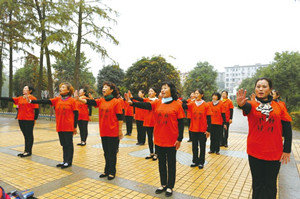Chinese City Steps Up Effort to Tackle Domestic Violence
 |
| Volunteers from Yuetang District, Xiangtan, raise people's awareness on domestic violence at a park. [China Women's News] |
Xiangtan, a city in central China's Hunan Provice, has recently issued a raft of regulations against domestic violence.
Encompassing 18 different steps, the measures were jointly issued by nine government organizations including the local court, the procuratorate, the women's federation, the public security department, the judiciary and the civil affairs department, as well as the education and health authorities.
Risk Assessment
"A highlight of the new regulations is the introduction of a domestic violence risk assessment system," said Zhao Huan, president of Xiangtan Women's Federation.
Different domestic violence cases should be dealt with by different measures, but currently China has not adopted any standard for the degree of risk faced by those exposed to domestic violence, Zhao said.
Drawing upon the experience of Taiwan and with the assistance of domestic psychological experts, the relevant authorities of Xiangtan have put together an assessment form, which included 11 questions based on which the severity of domestic violence cases are determined.
According to local regulations, while taking intervention measures against domestic violence, relevant authorities should use the assessment form to evaluate the cases before publishing the evaluation outcome and the basic information about the case to the Information Platform for Multidisciplinary Cooperation Against Domestic Violence within 24 hours.
The regulations identify the risk categories as "low", "medium", and "high". For cases graded as a "medium" or "high" risk, relevant authorities will adopt measures including following the offender closely, applying to the local court for issuing a ruling on the protection of the victim's personal safety, and granting legal assistance to the victim, among others.
A joint-meeting of various authorities will also be held for cases identified as "high" risk.
Dissuasion
"The regulations also attach great importance to the role of the public security authority in implementing anti-domestic violence efforts," said Zhao.
While drawing upon the experience of other places, the regulations introduce an "injunction order" system, she added.
According to the regulations, police at the local police station have the right to issue an Injunction Letter on Domestic Violence, which is read to the parties involved, signed and archived.
Police are also obliged to invite local civil affairs mediators, women's organizations, and related grassroots organizations to take part in the process of dissuasion.
If the abuser refuses to correct his or her behavior or is found to have committed such abuse again, he or she will be handled by the public security officials according to the law.
The Injunction Letter, nevertheless, cannot be used to issue any punishment, the regulations point out. Any punishment of the abuser will be conducted according to relevant laws.
Role of Local Women's Federation
The regulations also specify the responsibilities of the local women's federation, said Zhao.
They are responsible for setting up the Information Platform for Multidisciplinary Cooperation Against Domestic Violence to facilitate the implementation of the reporting system for domestic violence cases.
They are also required to establish and improve the network for the protection of rights of the victims of domestic violence and coordinate other authorities in the intervention, mediation and follow-up of domestic violence cases.
Furthermore, they will be asked to provide psychological counseling services to survivors.
Role of Other Authorities
According to the regulations, local People's Courts should establish a special collegiate panel for domestic violence cases, or set aside designated persons to hear domestic violence cases.
The civil affairs organizations are required to provide shelter for the survivors and grant aid to those who are impoverished.
Anti-domestic violence knowledge should be popularized in schools and kindergartens with the guidance of the education authorities and assistance of various kinds should be given to minors having suffered or suffering from domestic violence, the regulations said.
Impact
As of the end of June, the local authorities have held two capacity-building training sessions centering around the issue of anti-domestic. At the sessions, officials from various disciplines studied the regulations.
The regulations have already yielded positive results since their introduction.
On July 28, the women's federation of Yuetang District, Xiangtan, returned to a woman who had suffered violence from her husband for seven years. Surnamed Liu, the woman said that after she reported the case over a month ago there has been no violence again in her family since then thanks to the support of the women's federation. This was the first case handled following the implementation of the regulations.
Li Ying, a lawyer with Beijing Yuanzhong Gender Development Center, a domestic NGO, applauded the regulations, saying that many of them are innovative and play an exemplary role for other places to follow.
Ouyang Yanwen, associate professor of the Hunan Policy Academy, held that the regulations show that relevant authorities of Xiangtan are determined to clamp down on domestic violence and make positive contributions to anti-domestic violence legislation nationwide.
"We are looking forward to the success of the experiment and wish it can offer references for anti-domestic efforts in the whole province and the whole country," stated Peng Di, director of the Interests and Rights Division of Hunan Women's Federation.
(Source: China Women's News/Translated and edited by Women of China)
Please understand that womenofchina.cn,a non-profit, information-communication website, cannot reach every writer before using articles and images. For copyright issues, please contact us by emailing: website@womenofchina.cn. The articles published and opinions expressed on this website represent the opinions of writers and are not necessarily shared by womenofchina.cn.

 京公网安备 11010102004314号
京公网安备 11010102004314号